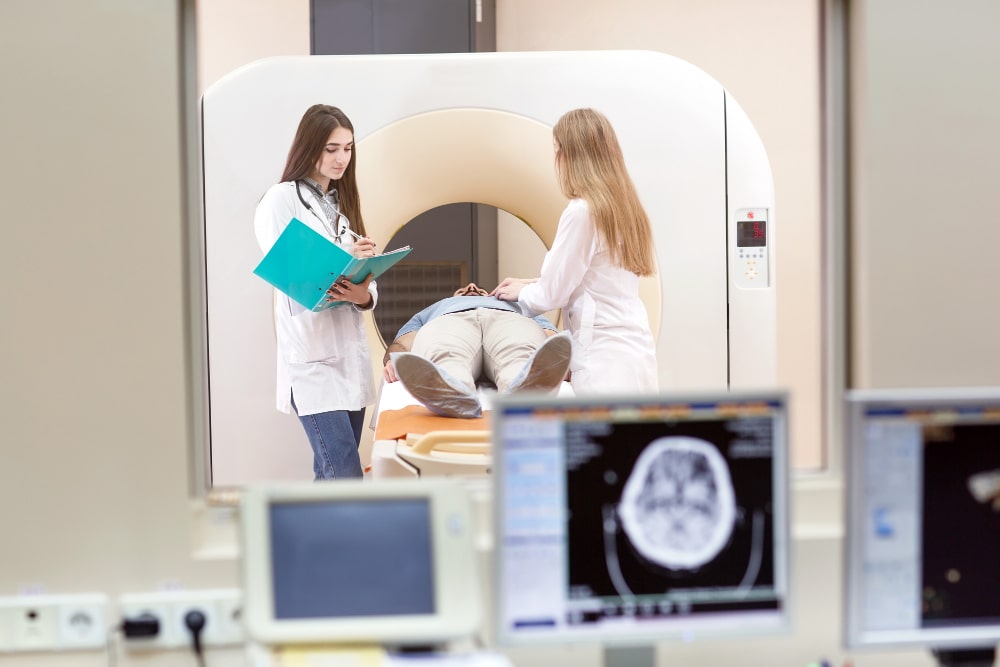A Computed Tomography Scan, also known as the CT scan, is a special X-Ray that shows the particular cross-sectional images of the scanned body. The machines scan the designated part, such as the pelvic and abdomen, and then send data to the technical team for the final report.
The CT abdomen pelvis with contrast is a particular image formed after the absorption of oral barium (liquid solution). The information is generated after the experts review the CT scan of the chest abdomen pelvis. In support of the abdominal CT scan, the pelvic CT scan is to check and diagnose organs or tumors.
The CT abdomen with contrast measures the results before and after the treatment. Hence, a CT scan for the chest abdomen pelvis helps visualize the conditions of the organ so that doctors can make effective decisions.
Why do you need a CT scan, and what does it show?
A CT scan for the abdomen and pelvis checks the organs like the reproductive system, gastrointestinal, endocrine, and urinary. It checks for injuries, internal bleeding, lesions, pain, obstacles, or any other physical examination. Apart from biopsies, there are many reasons for which CT scans can be used. Some of them are listed below:
-
In the case of Kidney stones
-
Any unexplained pain in the abdomen area
-
A sudden weight loss with no reason
-
Any symptoms of appendix rupture
-
Checking reproductive system (for female CT scan abdomen)
-
If a doctor or healthcare worker wants to check for Crohn’s disease (any inflammation in the intestine)
-
On sudden cancer diagnosis
-
For any lump or mass, someone feels in the abdomen area
Hence, under the guidance of medical experts, an abdominal CT scan is performed to evaluate treatment or diagnose a problem for the patient.
What does CT Scan of Abdomen and Pelvis with contrast show?
Same as the abdomen, a pelvic CT scan can show prostate, urinary bladder, bowel, liver, or even uterus problems.
After pointing out its usage, let us also discuss how to use it for effective results.
How to prepare for a CT abdomen and pelvis with contrast
Initially, we need to understand the terminology of with and without contrast. For example, a CT abdomen and pelvis with contrast means improved images from inside the body. With contrast is done either orally or through an enema.
Hence, to start for a CT scan abdomen initially, do not eat or drink for a minimum of two hours. Then, depending on the condition, the doctor may stop medications as well. The patient will probably be given a hospital gown and asked to remove any glasses, jewelry, piercing, clips, hearing aids, metal wire undergarments, or dentures.
Then, for a CT abdomen with contrast, the nurse, doctor, or healthcare worker would ask you to drink a glass of liquid. It will either be a solution called barium or gastrografin. After drinking the solution, you would have to wait for 60-90 minutes so that the contrast can adequately move around in your body. However, if you are allergic to iodine, have diabetes, or are pregnant, please inform your doctor before taking any risk.
What happens during the scan?
It usually takes 10-30 minutes and is generally performed in a radiology department or a lab specialized for such tests. For scans like a pelvic CT, after taking the IV solution, you might have to lie down on a table to start the procedure. By now, this contrast dye would have gone through your veins, and you might feel a warm sensation. Thus, after lying down on the table, you would be positioned carefully for better scanning. The doctor will control the scan from a separate room, and the patient laid on a table is passed through the machine several times. This is to make sure that the technician gets the accurate and precise scanning of the patient.
What happens after the scan?
After doing a proper CT scan of the chest abdomen pelvis, you can get back to your normal daily activities. First, however, you need to drink a lot of water to flush out the entire liquid contrast solution from your body.
After that, you have to wait for your report and then take it to the doctor to proceed with further diagnosis or treatment. Even though there are no adverse effects of a contrast CT scan, patients can face some side effects after the scan.
Possible side effects and risks of contrast solutions
The reaction to contrast is very mild, but it is advisable to consult the doctor immediately in case of any severe reaction. Some common side effects are listed down below:
What are the possible outcomes from a CT scan of the chest abdomen pelvis?
A CT abdomen pelvis with contrast is considered ideal in diagnosing any issues in the organs of the abdomen area. A scan can diagnose minor problems like kidney stones and even significant diseases like cancer or tumor. Hence, it is advisable to always go for it whenever required by a doctor. It is safe and carries mild to zero side effects.
Our clinical experts continually monitor the health and medical content posted on CURA4U, and we update our blogs and articles when new information becomes available. Last reviewed by Dr.Saad Zia on Nov 27th, 2023.
References
RadiologyInfo: Abdominal and Pelvic CT (radiologyinfo.org)
American College of Radiology: Acute Nonlocalized Abdominal Pain (acr.org)
Healthline: Abdominal CT Scan with Contrast: Purpose, Risks, and More (healthline.com)












